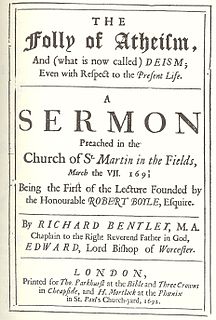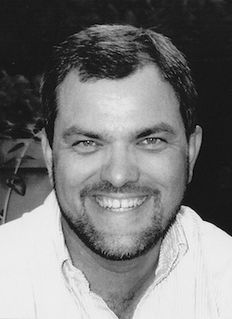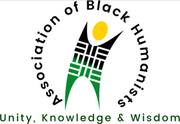
Sir Jonathan Wolfe Miller CBE was an English theatre and opera director, actor, author, television presenter, humourist and medical doctor. After training in medicine and specialising in neurology in the late 1950s, he came to prominence in the early 1960s in the comedy revue Beyond the Fringe with Peter Cook, Dudley Moore and Alan Bennett.

Negative atheism, also called weak atheism and soft atheism, is any type of atheism where a person does not believe in the existence of any deities but does not necessarily explicitly assert that there are none. Positive atheism, also called strong atheism and hard atheism, is the form of atheism that additionally asserts that no deities exist.
Nontheism or non-theism is a range of both religious and nonreligious attitudes characterized by the absence of espoused belief in a God or gods. Nontheism has generally been used to describe apathy or silence towards the subject of God and differs from an antithetical, explicit atheism. Nontheism does not necessarily describe atheism or disbelief in God; it has been used as an umbrella term for summarizing various distinct and even mutually exclusive positions, such as agnosticism, ignosticism, ietsism, skepticism, pantheism, atheism, strong or positive atheism, implicit atheism, and apatheism. It is in use in the fields of Christian apologetics and general liberal theology.

Jean Meslier was a French Catholic priest (abbé) who was discovered, upon his death, to have written a book-length philosophical essay promoting atheism and materialism. Described by the author as his "testament" to his parishioners, the text criticizes and denounces all religions.
Atheism is the absence of the belief that deities exist. The English term was used at least as early as the sixteenth century and atheistic ideas and their influence have a longer history.
The Atheism Tapes is a 2004 BBC television documentary series presented by Jonathan Miller. The material that makes up the series was originally filmed in 2003 for another, more general series, Atheism: A Rough History of Disbelief, but was too lengthy for inclusion. Instead, the BBC agreed to create The Atheism Tapes as a supplementary series of six programmes, each consisting of an extended interview with one contributor.
Criticism of atheism is criticism of the concepts, validity, or impact of atheism, including associated political and social implications. Criticisms include positions based on the history of science, philosophical and logical criticisms, findings in the natural sciences, theistic apologetic arguments, arguments pertaining to ethics and morality, the effects of atheism on the individual, or the assumptions that underpin atheism.

Discrimination against atheists, both at present and historically, includes persecution of and discrimination against people identified as atheists. Discrimination against atheists may also comprise negative attitudes, prejudice, hostility, hatred, fear, or intolerance towards atheists and atheism. Because atheism can be defined in various ways, those discriminated against or persecuted on the grounds of being atheists might not have been considered atheists in a different time or place. 13 Muslim countries officially punish atheism or apostasy by death, while "the overwhelming majority" of the 193 member states of the United Nations "at best discriminate against citizens who have no belief in a god and at worst can jail them for offences dubbed blasphemy".

Implicit atheism and explicit atheism are types of atheism. In George H. Smith's Atheism: The Case Against God, "implicit atheism" is defined as "the absence of theistic belief without a conscious rejection of it", while "explicit atheism" is "the absence of theistic belief due to a conscious rejection of it". Explicit atheists have considered the idea of deities and have rejected belief that any exist. Implicit atheists, though they do not themselves maintain a belief in a god or gods, have not rejected the notion or have not considered it further.

The Twilight of Atheism: The Rise and Fall of Disbelief in the Modern World is a book by Christian theologian and apologist Alister McGrath which traces the perceived decline of secular thought over the last two centuries.
The following outline is provided as an overview of and topical guide to atheism:
Christian atheism is a form of cultural Christianity and ethics system drawing its beliefs and practices from Jesus' life and teachings as recorded in the New Testament Gospels and other sources, whilst rejecting supernatural claims of Christianity.

The Portable Atheist: Essential Readings for the Nonbeliever (2007) is an anthology edited by Christopher Hitchens. Hitchens wrote introductions to each article he compiled for the book. The main introduction is centered on an unbeliever's point of view, what he is constantly told, "and the errors incurred by religion, since the pre-history of our species, in identifying not just the wrong explanation but the wrong culprit in episodes of nightmarish ignorance and calamity".
Atheism is in the broadest sense an absence of belief in the existence of deities. Less broadly, atheism is a rejection of the belief that any deities exist. In an even narrower sense, atheism is specifically the position that there are no deities. Atheism is contrasted with theism, which in its most general form is the belief that at least one deity exists.

Atheism, as defined by the entry in Diderot and d'Alembert's Encyclopédie is "the opinion of those who deny the existence of a God in the world. The simple ignorance of God doesn't constitute atheism. To be charged with the odious title of atheism one must have the notion of God and reject it." In the period of the Enlightenment, avowed and open atheism was made possible by the advance of religious toleration, but was also far from encouraged.

Dale McGowan is an American author, educator, podcaster, and philanthropist who has written and edited several books related to nonreligious life, particularly parenting without religion.
Though atheists in the Middle East are rarely public about their lack of belief, as they are persecuted in many countries, including Saudi Arabia where they were classified as terrorists, there are some atheist organizations in the Middle East. In the Middle East, one branch of religion dominates the geographical demography: Islam. Within these population, nonetheless, reside the small margin of those who are without faith, and who often face serious formal, and in some cases informal, legal and social consequences.

Atheism in the African Diaspora is atheism as it is experienced by black people outside of Africa. In the United States, blacks are less likely than other ethnic groups to be religiously unaffiliated, let alone identifying as atheist. The demographics are similar in the United Kingdom. Atheists are individuals who do not hold a belief in a god or in a plurality of gods. Atheism is not a disbelief in gods or a denial of gods; it is a lack of belief in gods. Some, but not all, atheists identify as secular humanists, who are individuals who believe that life has meaning and joy without the need for the supernatural or religion and that all individuals should live ethical lives which can provide for the greater good of humanity. Black atheists and secular humanists exist today and in history, though many were not always vocal in their beliefs or lack of belief.

Association of Black Humanists is a British organisation based in London, England. It encourages humanists and atheists to meet up, socialise, share information and support other atheists as they "come out" to friends and family, particularly people in ethnic minorities and people of the African diaspora.










